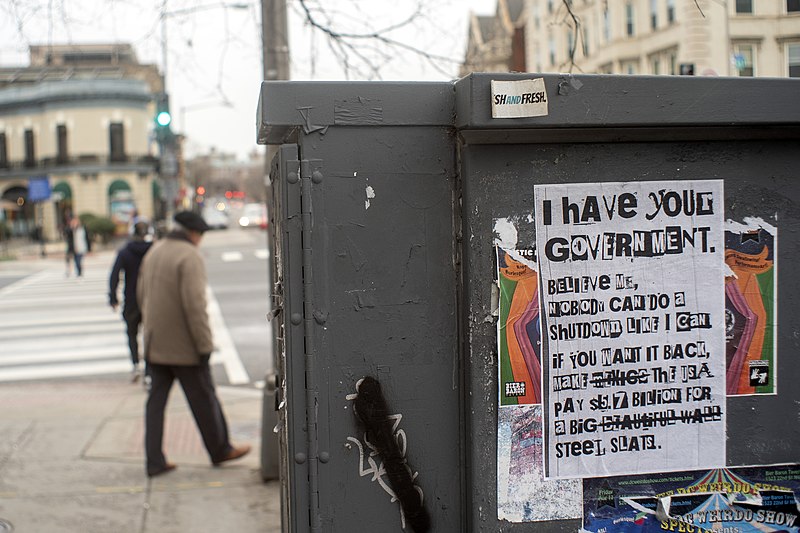
Jan 13 2019
In America this week, the news airwaves were dominated by concerns over an extended government shutdown. Coming from a country where shutting down the government is unheard of, I learned a lot about Washington’s political machinery, and developed an even keener sense of the essential services that a government performs, services that many of us take for granted.
As The World Turns
Big government, small government…no government at all?
There’s a case to be made for government regulations that strangle innovation, or stifle our way of life. As a small business owner, for instance, it’s irksome to follow archaic rules that haven’t kept up with the business-building times. And I had a long conversation once, in a hotel pool (of all places!), with someone who felt he was bearing an unduly heavy tax burden for owning a home (as opposed to being a renter).
But since Dec 22 2018, when the US government went into a partial shutdown, Americans are beginning to see some hidden ways the government keeps the country running. When the shutdown began, my mind turned immediately to air safety, and the financial hardship of air traffic controller and airport security staff. Reporters covered the shutdown impact on other essential services, like a reduction in food inspections, garbage and human waste piling up at National Parks, a suspension of the cleanup at Superfund sites (that contain toxic residue from the country’s factories and mines), further strain on the “tremendous backlog” of cases in the immigration courts, and losing access to some important economic data (which affects decision-making during trade tensions with other countries).
The impasse stems from the president’s desire to fulfill a key campaign promise – to build a (concrete) wall on the Southern border of the United States, to curb criminals, drugs, terrorists, and illegal migrants from entering the country. What are the facts on the ground, and is this the national security emergency the administration proclaims it to be? According to a PBS Newshour report, and NBC news article, the facts don’t justify this particular Southern border policy. And this bipartisan-minded Republican lawmaker wants his colleagues in the US Congress to come back to center, and solve the issue more holistically and practically.
Deep state…or protecting democracy?
This week, there were 2 significant stories from the far-reaching legal investigation into possible connections between the Trump presidential campaign and Russian meddling in the 2016 presidential election. According to an unsealed court document, Trump campaign manager Paul Manafort had “shared political polling data with a business associate tied to Russian intelligence.” And days after the president had fired FBI director James Comey, the agency “began investigating whether he had been working on behalf of Russia against American interests.”
To many Americans, it was another example of the deep state at work.
The term “deep state” has been thrown about, at will, during the Trump presidency, to indicate the bureaucratic threat to his policies. And in a 2017 poll, nearly 50% of Americans say a deep state exists, with more people under 30 believing so.
But what is the deep state, and how dangerous is it to the rule of law, or to political/civilian oversight? In this nuanced explainer, foreign affairs correspondent Michael Crowley writes, “Political scientists and foreign policy experts have used the term deep state for years to describe individuals and institutions who exercise power independent of—and sometimes over—civilian political leaders.” He then summarized the current state of affairs as a “politics of convenience”:
“Thus have the old battle lines flipped. Conservatives who once dismissed concerns about political abuse of NSA surveillance now complain about intelligence leaks linking Trump associates to the Kremlin; liberals who not long ago were denouncing the CIA for its unaccountable power have discovered new affection for the heroes at Langley who might uncover impeachment-worthy dirt.
Beneath the politics of convenience is the reality that a large segment of the U.S. government really does operate without much transparency or public scrutiny, and has abused its awesome powers in myriad ways. And sometimes the government bureaucracy really does exercise power over the commander in chief…”
Michael Crowley
Foreign Affairs CorrespondentOm Is Where The Heart Is
Sometimes there’s a (shockingly) happy ending
“Jayme is safe!” Barron County Sheriff Chris Fitzgerald said on Friday. “It’s amazing, the will of that 13-year-old girl to survive and escape.”
On Oct 15 2018, a gunman murdered Jayme Closs’ parents, then kidnapped her until she, miraculously, escaped from her captor’s home this week.
I’ve watched too many child/teen kidnappings end in tragedy – a body found, a family inconsolable, a community or nation numbed from the senselessness of it all.
Jayme’s happy ending reminds me that the ferocity of the human spirit, to find its freedom, and to find its way to a home/family that cherishes it, can triumph over so much of the evil and hatred in this world.
News and Views
We Will Rock You
Britain’s rock band Queen was big in the 1970s and 80s, when I was growing up, and growing into my musicality. Their songs and theatrical flair were part of my taste-making fabric. When the biopic Bohemian Rhapsody won Best Motion Picture – Drama at last weekend’s Golden Globe Awards, it was the final push I needed to watch the movie, and relive that phase of my musical world.

from BoingBoing via history101.com
I also knew I was taking a risk.
When I decide to immerse myself in mystical and wonderful worlds like Freddie Mercury’s, it takes me on a multi-day journey into his life, his legacy, and his eternal essence. I lose track of time, consume one song/video/article/historical factoid after another, my logical brain wanting to step away while my soul says to go deeper, further, and longer. (As I shared recently, when President George H.W. Bush passed, this is my occupational hazard of being a spiritual biographer.)
That’s exactly what happened this week. And I loved every minute of it.
Freddie, and Queen, thank you for rocking us with your music. We forever bow to your majesty.
In the next issue:
I’m continuing the behind-the-scenes work to reboot my podcast – a virtual book club for executives, civic leaders, and creative thinkers who want to lead and create from a more soulful place. Will probably share more next week.
Till then…
Live well and lead large – Maya
(featured image by Mike Maguire) [CC BY 2.0], via Wikimedia Commons


